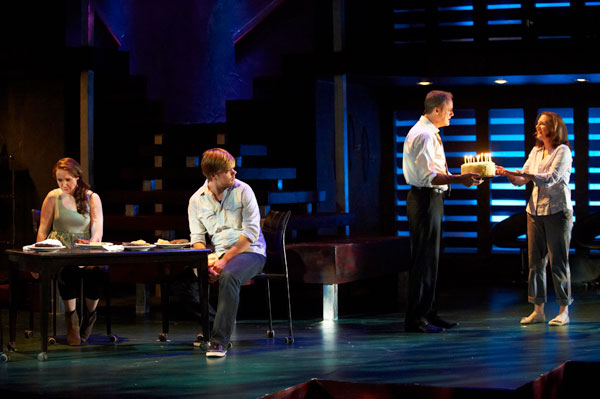Fitting in seems overrated in two musicals of substance
ARNOLD WAYNE JONES | Life+Style Editor
jones@dallasvoice.com
……………………..
ON THE BOARDS
NEXT TO NORMAL at the Kalita Humphreys Theater, 3636 Turtle Creek Blvd.
Through July 3. UptownPlayers.org.
BILLY ELLIOT at the Winspear Opera House,
4103 Flora St. Through June 19.
ATTPAC.org.
……………………..
Reality: It’s so inconvenient sometimes. For Diana, the wife and mother in Next to Normal, reality often means staying drugged to the point of catatonia; for 12-year-old working class kid Billy Elliot struggling through life in an England mining town interferes with his passion to dance. Mental illness and politico-economic upheaval — not exactly the stuff of the typical song-and-dance musical. But there is little typical about either of these shows.
For Uptown Players, the regional premiere of Next to Normal is the best show the company has ever done: The best cast, all of whom are at the top of their games; the best set; the best band (a pitch-perfect performance, led by music director Scott A. Eckert); and the best directing personally for Michael Serrecchia, who moves the scenes seamlessly as the play hits you in waves, alternatingly poignant and humorous.
It’s not the easiest material to make into a musical. Diana (Patty Breckenridge) had struggled with bipolar disorder for years, ever since a tragedy left her with a slipping grip on reality. Her husband Dan (Gary Floyd) has soldiered on, monitoring her prescription use and looking for warning signs. But what if Diana doesn’t want to feel “normal”? What if feeling a little crazy is her baseline — it’s normal for her?
At the same time we watch Dan and Diana work through their marriage, we see how their daughter Natalie (Erica Harte) and her new boyfriend Henry (Jonathan W. Gilland) mirror their relationship from 20 years ago.
These are heavy issues, but for each moment of devastation, you are simultaneously awed by its beauty and power. It helps that the score — basically a rock opera — is performed by some of the best singers around. On all her songs, Breckenridge reaches into the emotion and the musicality; nowhere is she better than on “I Miss the Mountains,” a heartfelt ballad of the Jewel-Indigo Girls variety that you can imagine hearing on the radio.
Floyd’s lilting tenor melds gorgeously with Anthony Carillo, playing Dan and Diana’s son Gabe, especially on “I Am the One” and “It’s Gonna Be Good.” Carillo imbues his performance with an impressing physicality as well, bursting out of his skin on the anthem “I’m Alive.”
Next to Normal, which won the Tony Award for best score as well as the Pulitzer Prize for drama, sounds sad, and sometimes it is, but its genius is leaving the audience with the memory of the power of the human spirit. This is not a musical about depression; it is a musical about hope.
………………………
You could say almost the same thing about Billy Elliot, now at the Winspear Opera House. This national tour of the Elton John hit about how a boy discovers ballet is perhaps an even less likely topic for a musical treatment, given its context: A strike during the Thatcher Administration that, in the mid-1980s, nearly resulted in a British civil war, and polarized the classes in a way that hadn’t been seen in a century.
Billy (played on press night by Giuseppe Basilio, but with a rotating Billy almost each performance) is growing up amid the fiercely testosterone-fueled environs of Northern England, with a father and older brother who are miners, with only the memory of his late mother and his often soused grandmother to nurture him.
Billy is forced to study boxing, but when he wanders into a ballet class led by Mrs. Wilkinson (Faith Prince), he begins to realize that being different isn’t easy, but it sure is liberating.
You know you’re in a strange world, even in musical theater, where the showstopping number in the first act (“Expressing Yourself”) is a lavish tap-dancing fantasy about the joys of cross-dressing, led by Billy’s fey companion Michael, who seems more at home in his burgeoning sexuality than his older friend.
Everything about this production is massive — the sets, the themes, the score, the dances, the talent, even the accents — except the kernel of it: The lone boy who wants to make a better world for himself. (In the show’s most moving sequence, miners contribute what they can to help fund Billy’s audition for the Royal School of Ballet, because they realize — sadly, beautifully — that Billy represents the future, their future, as their industry is being gutted by right wing bullies.)
Broadway veteran Prince demonstrates her star-power with a flashy supporting role, but Basilio is a remarkable young dancer, with fine lines and a commanding presence during a duet with his older self and on his big solo number, “Electricity.” On opening night, the audience swelled in a sustained, spontaneous ovation. It was completely deserved. It was, itself, electric.
This article appeared in the Dallas Voice print edition June 17, 2011.

















